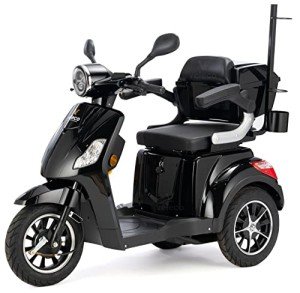Understanding Mobility Scooters: A Comprehensive Guide
Mobility scooters have actually become an important tool for individuals who deal with mobility challenges, providing independence and a method of transportation. They are developed to help users in navigating different terrains, whether indoors or outdoors, enabling them to engage more fully in daily activities. This article will explore the kinds of mobility scooters, their features, advantages, and factors to consider for possible users.
What is a Mobility Scooter?
A mobility scooter is a motorized car made for people with physical limitations. It helps users preserve their mobility and independence, offering an effective means of transportation over short ranges. While they might look comparable to small electric vehicles, mobility scooters are generally powered by batteries, with controls developed for ease of usage.
Types of Mobility Scooters
There are a number of kinds of mobility scooters readily available in the market, each developed to accommodate different requirements and choices. Here's a breakdown of the most typical types:
| Type of Mobility Scooter | Description | Best For |
|---|---|---|
| Three-Wheeled Scooters | These scooters provide outstanding maneuverability and small turning radius however may do not have stability. | Indoor use and tight areas. |
| Four-Wheeled Scooters | Often more steady than three-wheeled models, these scooters are ideal for outside usage. | All-terrain travel and outside activities. |
| Portable Scooters | Lightweight and foldable, these scooters are designed for simple transportation. | Travelers and people with limited storage space. |
| Heavy-Duty Scooters | Developed for bigger users, these are robust and can manage heavier weights, frequently equipped with better battery life. | Users requiring extra assistance and stability. |
| Feature-Rich Scooters | These might include innovative innovation such as Bluetooth connection, built-in GPS, and adjustable seating. | Tech-savvy users looking for comfort and convenience. |
Secret Features of Mobility Scooters
When selecting a mobility scooter, buyers ought to consider several necessary functions. The following list details vital aspects that can greatly influence their experience:
- Weight Capacity: Understanding the scooter's weight limitation is essential to ensure security and performance.
- Battery Life: A longer battery life equates to more extended use between charges, which is crucial for lengthy journeys.
- Speed: Typical mobility scooters can reach speeds in between 4 to 8 miles per hour, but it's necessary to select one that matches the user's needs.
- Convenience: Look for adjustable seats, armrests, and back-rests that improve the total riding experience.
- Portability: If traveling regularly, a lightweight and foldable scooter is helpful.
- Terrain Capability: Some scooters are much better equipped for rough terrains, while others work best on smooth surface areas.
Advantages of Using Mobility Scooters
Mobility scooters offer a number of benefits that can significantly enhance users' quality of life. These include:
Increased Independence
Numerous individuals who fight with mobility rely on household or caretakers for transportation. Mobility scooters empower users to move about easily and conduct errands on their own, promoting a sense of self-reliance and self-sufficiency.
Enhanced Quality of Life
Having the capability to travel unassisted can lead to social engagement, enhanced psychological well-being, and in general better quality of life. Users can take part in social activities, visit buddies and family, and explore their communities.
Cost-Effectiveness
Compared to other mobility help or services, mobility scooters can be more cost-efficient. her response can get rid of the need for costly modifications to homes or reliance on transportation services.
Adjustability and Customization
Numerous mobility scooters feature choices for modification, making sure that users can customize them to best meet their private requirements.
Considerations Before Purchase
Before choosing the ideal mobility scooter, potential buyers must keep these considerations in mind:
- Lifestyle Needs: Assess how the scooter will fit into day-to-day routines, consisting of the frequency and places of usage.
- Trial Rides: If possible, taking a few models for a test drive can assist evaluate convenience and maneuverability.
- Spending plan: Costs can differ extensively, so specifying a budget upfront is essential.
- Guarantee and Service: Always think about the service warranty offered and the availability of customer care in case of repairs.
Frequently Asked Questions About Mobility Scooters
1. How fast do mobility scooters go?
Mobility scooters usually vary from 4 to 8 miles per hour, depending upon the design and its power capability.
2. Are mobility scooters covered by insurance coverage?
Numerous insurance plans might cover part of the expense if a medical expert prescribes the scooter; however, policies vary significantly.
3. Can I drive a mobility scooter on the roadway?
This depends on local laws and guidelines. In some locations, mobility scooters may be allowed on public roads, while in others, they are restricted to pathways and paths.
4. The length of time does the battery last?
Battery life generally depends on the scooter design and kind of use. Common mobility scooter batteries can last anywhere from 6 to 12 miles on a single charge.
5. Are mobility scooters safe?
Mobility scooters are usually safe when utilized properly. It's vital to familiarize oneself with the controls and operate them properly.
Mobility scooters play an important function in the lives of individuals with mobility challenges. By understanding the types, features, advantages, and considerations associated with these vehicles, users can make informed options. This can lead to increased independence, a better lifestyle, and renewed access to the world around them. Whether for social trips, errands, or recreational activities, a mobility scooter can be a life-altering investment for lots of people.

